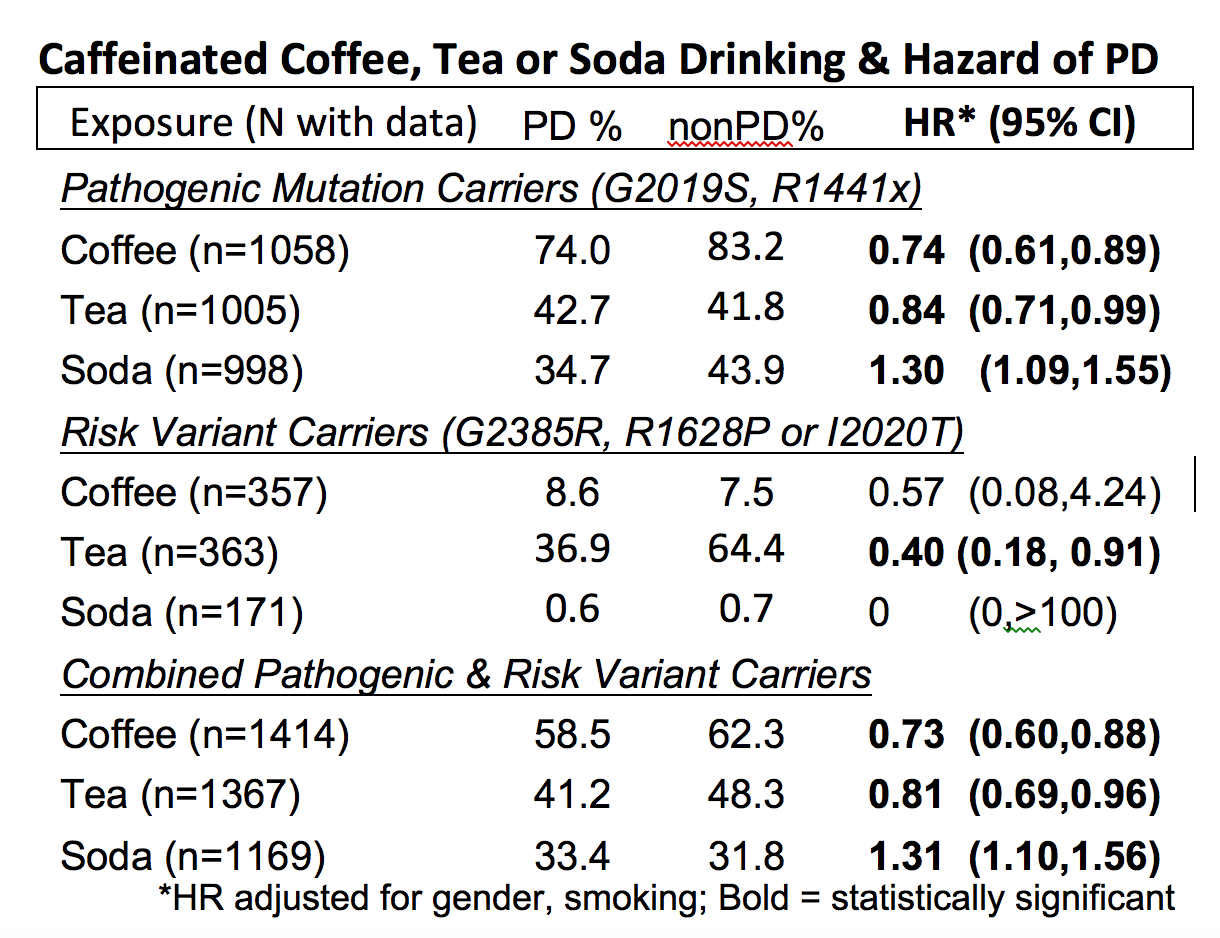Session Information
Date: Wednesday, June 7, 2017
Session Title: Parkinson's Disease: Genetics
Session Time: 1:15pm-2:45pm
Location: Exhibit Hall C
Objective: To determine the role of caffeine containing drinks on penetrance in LRRK2-associated PD
Background: LRRK2 penetrance is reduced for PD [1]. Environment and/or other genes may influence penetrance. Coffee and tea use may lower PD risk [2], and this has been proposed to be an effect of caffeine.
Methods: Consuming caffeinated drinks was assessed in persons carrying LRRK2 gene mutations (G2019S, R1441x, I2020T) or risk variants (G2385R, R1628P). The relationship between regularly drinking caffeinated beverages (defined as drinking at least once/week for > 6 months) prior to index date (“ID”, defined as PD onset date or interview date in unaffected), and hazard of PD was determined using Cox regression models, adjusted for gender and cigarette smoking.
Results: 887 PD (54.5% men, mean age at ID 55.9 years) and 533 unaffected carriers (39.4% men, mean age at ID 57.3 years) were enrolled, of whom 859 regularly used a caffeinated drink. Mean duration (years) of regular use of coffee was 19.6, tea 10.3, soda 7.3. Regular use of coffee or tea was associated with a reduced hazard of PD, but the hazard of PD was increased in regular users of caffeinated soda [table 1].
Conclusions: Caffeinated coffee and tea may reduce penetrance of LRRK2 PD. Caffeinated soda may increase penetrance. Non-caffeine components of these drinks, such as polyphenols in coffee and tea, or artificial sweeteners in soda, may contribute to these associations.
References: 1. Marder, K., et al., Age-specific penetrance of LRRK2 G2019S in the Michael J. Fox Ashkenazi Jewish LRRK2 Consortium. Neurology, 2015. 85(1): p. 89-95.
2. Ross, G.W., et al., Relationship between caffeine intake and parkinson disease. JAMA, 2000. 284(11): p. 1378-9.
To cite this abstract in AMA style:
C. Tanner, C. Marras, C. Meng, K. Marder, S. Bressman, R. Saunders-Pullman, R. Alcalay, E. Tolosa, A. Brice, S. Goldman, B. Schuele, A. Lang, S. Goldwurm, G. Riboldazzi, J. Ferreira, C. Klein, D. Berg, K. Brockmann, M. Tazir, J. Aasly, J. Marti-Masso, J. . Marti-Masso, R. Munhoz, C. Rieder, M. San Luciano, G. Mellick, C. Sue, K. Hasegawa, E. Tan, J. Langston, M. LRRK2 Cohort-Consortium. Caffeinated Drinks, LRRK2 Genotype and PD [abstract]. Mov Disord. 2017; 32 (suppl 2). https://www.mdsabstracts.org/abstract/caffeinated-drinks-lrrk2-genotype-and-pd/. Accessed January 21, 2026.« Back to 2017 International Congress
MDS Abstracts - https://www.mdsabstracts.org/abstract/caffeinated-drinks-lrrk2-genotype-and-pd/

